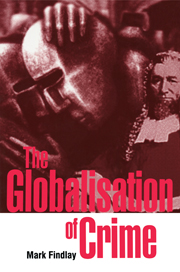Book contents
- Frontmatter
- Contents
- Preface
- Acknowledgements
- Introduction: Notions of context and globalisation
- 1 (Mis)representing crime
- 2 Crime and social development
- 3 Crime and social dysfunction
- 4 Marginalisation and crime relationships
- 5 Crime economies
- 6 Crime as choice
- 7 Integrating crime control
- Epilogue
- Bibliography
- Index
5 - Crime economies
Published online by Cambridge University Press: 22 September 2009
- Frontmatter
- Contents
- Preface
- Acknowledgements
- Introduction: Notions of context and globalisation
- 1 (Mis)representing crime
- 2 Crime and social development
- 3 Crime and social dysfunction
- 4 Marginalisation and crime relationships
- 5 Crime economies
- 6 Crime as choice
- 7 Integrating crime control
- Epilogue
- Bibliography
- Index
Summary
Concern for the context of crime, particularly its financial consequences, has stimulated speculation about the relationships between crime and enterprise, the organisational features of crime, and crime and market structures. With the emergence of ‘global economies’ and recent reflections on the capacity of modern industrialised societies to transform in the face of powerful political change, crime is receiving recognition as a significant commercial determinant. Rapid technological change and associated explosions in communications media have led not only to an erosion of national economic boundaries but to a globalisation of market opportunities. Arguably crime is a feature of economic choice.
The challenge facing global society is to advance socio-economic development in a manner which does not necessarily enhance crime. While wealth and prosperity remain in the hands of the few, and capital and resource disparity is rarely alleviated through development, crime will continue to exist within developing economies – as a consequence of such disparity, as well as a reaction to it. Disparity being a consistent feature of contemporary economies, crime and economy are thus inextricable.
With crime's potential to integrate marginalised elements within disparate economies, it exists as a selective force for globalisation. Here this selectivity relates to oscillating processes of empowerment and marginalisation which exist within the paradox of globalisation. Crime choices and relationships may also oscillate between contexts where marginalisation is exacerbated or reduced through empowering alternative opportunities. Many of these opportunities are economic in context and consequence.
- Type
- Chapter
- Information
- The Globalisation of CrimeUnderstanding Transitional Relationships in Context, pp. 138 - 166Publisher: Cambridge University PressPrint publication year: 1999



